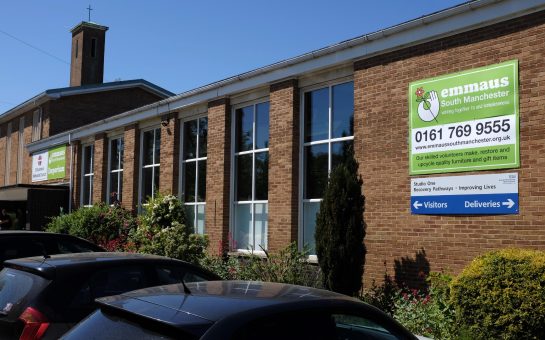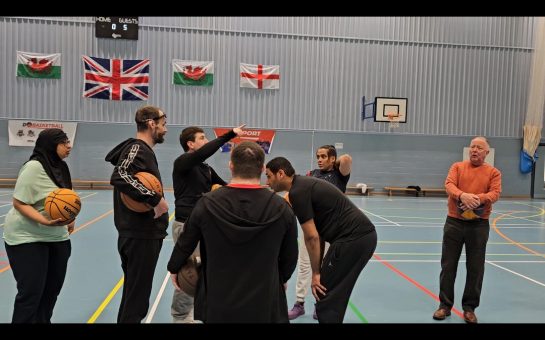An initiative which provided more than 700,000 free meals nationwide in 2020 launched two new projects in Oldham and Wythenshawe this month.
FoodCycle is a volunteer-run service that offers a weekly three-course sit-down meal to anyone who walks through the door – with no questions asked.
The new launches mean that FoodCycle now operates a total of 43 projects across the UK and five across Greater Manchester, covering areas such as Salford, Prestwich and Levenshulme, the latter of which runs a cook and collect service.
MM spoke with FoodCycle volunteers Jen Molloy and Zara Borji about the new initiatives.
Jen works in the communications team and attended the opening at the Wythenshawe branch.
She said: “It all went really well. There’s a really strong community here and a lot of the volunteers are local so they know everybody.”
Zara works with the programmes team in the North to run and manage projects.
She saw similar success at the Oldham opening: “We had about 30 guests arrive which was fantastic and everyone seemed to enjoy it.”
FoodCycle, which was first launched in 2009, aims to provide a safe and welcoming space for anyone wanting to join in.
Jen said: “Everybody’s welcome – there’s no means-testing.
“You never know who is going to come: we serve people from low-income families, people affected by homelessness, or people who are lonely – especially after the pandemic.
“There was a woman who suffered from really bad health issues, for example, which meant that she couldn’t prepare meals for herself. She said it was an amazing thing to come here as once a week she’s treated to a three-course meal when usually she just makes a sandwich or some toast.”
Zara added: “People always feel a bit shocked that there isn’t a catch and they can literally come in, sit down with us, and have a meal!”
The food provided is nutritious and warming, as volunteers understand that it could be the only hot meal guests get in a week: 62% of guests said that they rely on the service and could not otherwise afford food.
The meals are all vegetarian and usually begin with soup, followed by a main course, which can be anything from lasagne to stew.
Dessert is usually a fruit salad but, if guests are lucky, one of the volunteers will sometimes bake a cake.
Jen said: “We’ve had volunteers who used to be chefs and they make unbelievable, really tasty food. The cooks are super creative.”
By using surplus food, cooking from scratch, and either freezing or giving guests any leftovers, FoodCycle managed to save 359 tonnes of food waste in 2020.
For many who attend, however, the meal is just an added bonus to the amazing communities that begin to form during the sessions.
Jen told MM about FoodCycle’s intention to bring people together: “Our main aim is to connect communities through food and conversation.
“We stress all the time that we’re not a food bank: we don’t just give people food and send them away but bring them in so they can sit down, chat, and enjoy meals together.”
Zara agreed: “It’s like a family. People end up mainly coming for the social aspect and it’s lovely to see that they message each other and keep in contact outside of the group.”
FoodCycle’s aim to prevent loneliness is clear: in addition to the weekly meals, they also run a ‘Check-in and Chat’ telephone service where volunteers make phone calls to those who need to talk, spending a total of 1.2 million minutes on the phone over the past year.
The weekly meals are a safe space for guests to eat and talk to each other and the volunteers.
The projects have been a vital resource for people all over the UK throughout the Covid-19 pandemic.
A survey by Food Foundation found that ‘food insecurity’ – where people have limited or uncertain access to nutritionally adequate and safe foods – has increased in the UK during the pandemic.
The study showed that 4.7 million adults experienced food insecurity in the past six months, totalling 9% of all households, up from 7.6% pre-pandemic.
It also determined that Covid-19 has widened inequalities in food security, with groups such as BAME communities, those who are clinically vulnerable, and adults with disabilities being most affected.
FoodCycle has worked hard to combat this by running a food takeaway service when restrictions prevented them meeting for their usual sit-down meals.
Even with in-person meals returning, this continues to be an essential service for many in the community.
Zara explained: “We have a couple that comes for a sit-down meal but collects a tonne of meals to take away for their neighbours who don’t feel comfortable coming themselves just yet.”
FoodCycle is currently looking for new volunteers for the projects, offering flexible roles with no minimum time commitment in a number of areas such as food collection, cooking, and running projects.
Jen said: “We always need more volunteers, especially as we’re growing so much.”
She also reflected on the importance of her time volunteering with FoodCycle: “You leave the project feeling so amazing and that you’ve made a proper difference to someone’s life.
“One conversation with a guest can completely change your day and adjust your perspective.”
To sign up to become a volunteer or find out more visit FoodCycle’s website.
The Wythenshawe project meets on Wednesdays at 7pm at Brooklands Church, while the Oldham project is on Tuesdays at 7pm at the Primrose Centre.



